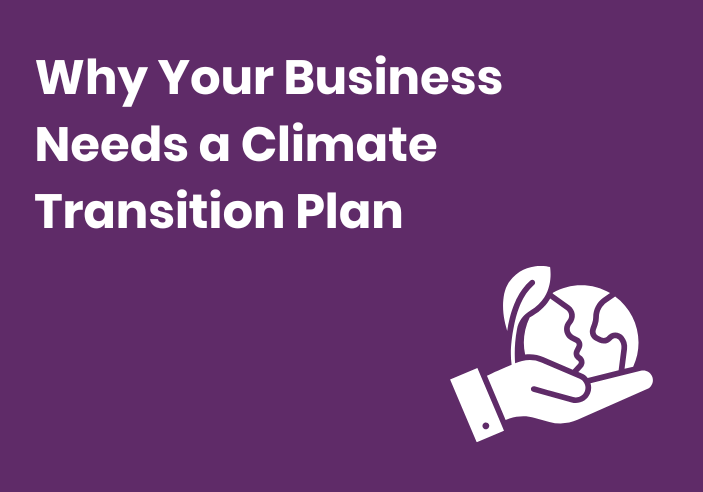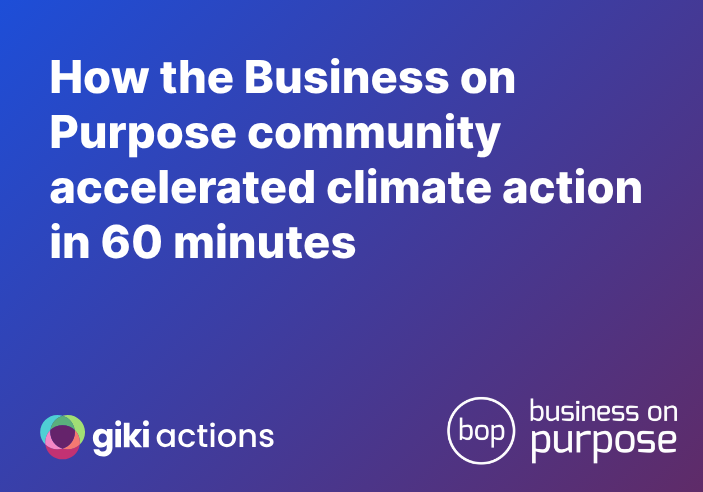
Why Your Business Needs a Climate Transition Plan
Climate Transition Plans aren't just about reducing emissions. They're your gateway to new contracts, cost savings, and staying ahead of the competition in a rapidly changing business landscape.
Small and medium-sized enterprises (SMEs) are a huge part of the global economy, representing about 90% of businesses and more than 50% of jobs worldwide. Together, they contribute between 50% and 64% of total business sector emissions, which makes them crucial to achieving the global goal of reaching Net Zero.
A Climate Transition Plan (CTP) is a document that outlines how a business will reduce their carbon footprint, and are becoming essential tools for businesses of all sizes. While larger corporations might grab the headlines with their Net Zero commitments, SMEs have just as much to gain from developing robust transition plans. Here's why creating a Climate Transition Plan isn't just good for the planet – it's good for business.
SMEs are pivotal in the race to Net Zero. They represent 90% of businesses and more than 50% of jobs wide, so their collective power and potential are immense. Race to Zero
Gaining the Competitive Edge
Forward-thinking SMEs are discovering that having a clear Climate Transition Plan opens doors to new opportunities. Many large corporations are now examining their entire supply chains, seeking suppliers who can demonstrate strong environmental credentials. A well-structured transition plan could be your ticket to preferred supplier status or help you stand out in a tender processes.
Moreover, consumers are increasingly making purchasing decisions based on environmental factors. Research from McKinsey shows that 66% of consumers (and 75% of millennials) said they consider sustainability when making a purchase. By developing and communicating your transition plan, you're positioning your business to capture this growing market of environmentally conscious customers.
66% of consumers (and 75% of millennials) said they consider sustainability when making a purchase. McKinsey.
Uncovering Cost Savings
Climate Transition Planning isn't just about future-proofing – it's about identifying immediate opportunities for efficiency and cost reduction. Through the process of developing a transition plan, businesses often uncover significant savings in:
- Energy usage: Simple changes in operations and equipment can lead to substantial reductions in energy bills
- Waste management: Better resource planning often results in less waste and lower disposal costs
- Process efficiency: Reviewing operations through a sustainability lens frequently reveals opportunities to streamline processes
- Supply chain optimisation: Understanding your carbon footprint often highlights opportunities for local sourcing and reduced transportation costs
SMEs could save up to 20-30% of their energy costs through implementing energy efficiency measures. Carbon Trust.
Meeting Rising Expectations
Customer and investor expectations around climate action are evolving rapidly. Even if your business isn't currently feeling pressure to act, the direction of travel is clear. Major investors are increasingly incorporating climate considerations into their decision-making, even for smaller businesses. If you're considering future growth or investment, having a credible transition plan could be crucial.
B2B customers are also raising their expectations. Large companies are now regularly asking their suppliers about their environmental credentials and future plans. Having a well-thought-out transition plan ready could be the difference between winning and losing contracts.
Staying Ahead of Regulation
The regulatory landscape around climate reporting and action is becoming more complex. While many current requirements focus on larger businesses, the trend is clear – more regulation is coming, and it's moving down the size spectrum. Here are some key developments to be aware of:
- UK: The Sustainability Disclosure Requirements (SDR) are being developed with UK-endorsed ISSB standards expected sometime in the 2025. There's a lot left on the how and the when but SMEs should prepare for supply chain requirements from covered companies. In the UK PPN06/21 remains just as important to many SMEs as it requires Carbon Reduction Plans for government contracts £5M+ annually, with NHS extending to all contract values back in 2024.
- EU: The Omnibus proposal has dramatically changed the scope of large company reporting (under the CSRD) but the VSME (Voluntary Sustainability Reporting Standard for non-listed SMEs) provides a practical way for SMEs to meet sustainability reporting demands from larger partners, banks, and investors while avoiding the complexity of full CSRD compliance even in its reduced form. It could become the de facto standard for value chain sustainability data requests in the EU and clearer plans are expected this year.
- Global: The International Sustainability Standards Board (ISSB) standards are going from strength to strength creating the worldwide baseline for sustainability reporting. With 15 jurisdictions already adopted and 22 more planning adoption, SMEs in global supply chains will increasingly need to be aware of ISSB.
- US: The proposed SEC rules on climate disclosure have now been stopped in their tracks.
“Global climate success and economic transition is only possible with SMEs as a central partner. They are more vulnerable to the impacts of climate change, face business continuity risks, and need capacity building to improve resilience." Nigar Arpadarai, UN Climate Change High-Level Champion for COP29 Azerbaijan

